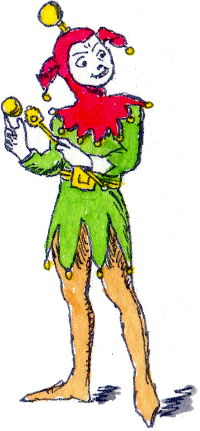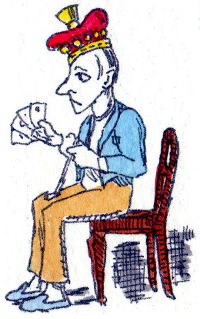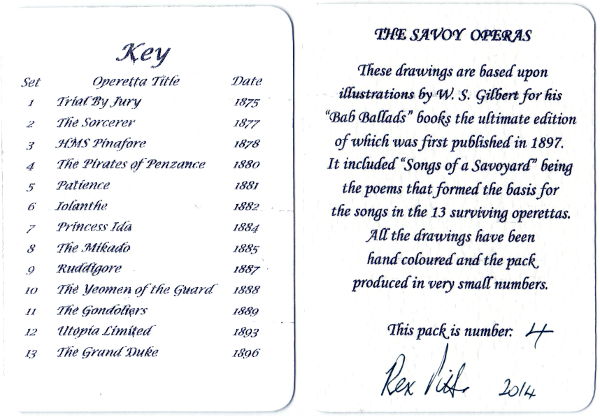Gilbert & Sullivan Cards
“Gilbert & Sullivan” hand-made Savoy Operas pack designed and created by Rex Pitts.

A hand-made pack of Savoy Operas cards, designed and created by Rex Pitts
Originally it was just for my own amusement but it proved so popular that I had to think again. I have made 4 numbered copies and plan to produce perhaps 10 in all. They are all printed on 200gsm watercolour card from my own drawings and hand coloured in transparent inks which is very time consuming, and cut with rounded corners. The backs are plain white. I am offering them for sale at £65 per pack.


Above: “Gilbert & Sullivan” hand-made pack of comic Savoy Operas cards designed and created by Rex Pitts, 2014. 52 cards + 2 extra cards, size 70mm x 99mm. Available directly from Rex Pitts→
Savoy opera was a style of comic opera that developed in Victorian England in the late 19th century, with W. S. Gilbert and Arthur Sullivan as the original and most successful practitioners. The name is derived from the Savoy Theatre... more →
See also Old Fashioned Snap→
-
Rex Pitts’ Biography
My parents were great amateur operatic enthusiasts and they were members of a couple of Operatic Societies in the 1930’s. This was in an age when people made their own entertainment and as a consequence of my Father’s enthusiasm all his three sisters joined him in the choruses for the performances these Operatic Societies put on. It was because of Gilbert and Sullivan that my Father and Mother met. They were both very good singers and played the principles in most of the Society’s performances. The picture is of them as Mabel and Frederick in a performance of “The Pirates of Penzance” in 1933 in Willesden northwest London.
After they got married I came along and we lived in a household full of music. My Father was a brilliant pianist with a great fondness for Chopin and Granados and he played almost every day. Very often my Mother and Father would sing together in the evening, usually a Gilbert and Sullivan song. Sometimes, when relatives visited, they brought with them their musical instruments or just their voices for and evening of musical fun. My Father tried to teach me to play the piano but to my everlasting regret I stopped practising and never learned.
I have retained a lifelong love of Gilbert and Sullivan which is why, a few years ago, I made a series of drawings based on the engravings that illustrated W S Gilbert’s “Bab Ballads” books. I made them on cards which I had an idea would make and interesting little pack for a bit of fun. They were just black and white at the time and I put them away and forgot about them. I did notice that there were 13 surviving Operettas by G & S and 4 sketches for each one made a total of 52 cards and played with the idea of making them into a suited pack of cards. Unfortunately I had not left enough space for a suit sign on many of the cards so I gave up on that one. What I had was a pack for a game of Quartet, played like Happy Families.
More recently, only this year in fact, it crossed my mind that the cards might look better if they were coloured. I scanned my original sketches and tried to paint some with watercolour paints – terrible! I took a trip to my local Art Shop in Bungay to ask for advice and there I got lots of advice and tips and came away with little bottles of coloured inks used by calligraphers. Next problem was the card. Any card I tried was pretty useless and the colouring just didn’t come out right. Back to the Art Shop. Try this they said and offered me a 200gsm NOT watercolour paper. Well, this was fantastic – worked perfectly. What I do now is; using my computer’s printer I copy my original drawings on to the watercolour paper which will just go through the printer. Then I cut the cards out by hand using a craft knife. After colouring the cards with brushes and the ink (this is the bit that takes a long time) I use a little corner cutter to make the rounded corners. Finally I make a box from coloured card in the same way as I have been doing for years when I get a game which has lost its box. This is finished off with a spare hand coloured card stuck on it. Final touch is a Key Card with the dates of the Operas and another with a short description of the process and a pack number with my signature.

By Simon Wintle
Member since February 01, 1996
I am the founder of The World of Playing Cards (est. 1996), a website dedicated to the history, artistry and cultural significance of playing cards and tarot. Over the years I have researched various areas of the subject, acquired and traded collections and contributed as a committee member of the IPCS and graphics editor of The Playing-Card journal. Having lived in Chile, England, Wales, and now Spain, these experiences have shaped my work and passion for playing cards. Amongst my achievements is producing a limited-edition replica of a 17th-century English pack using woodblocks and stencils—a labour of love. Today, the World of Playing Cards is a global collaborative project, with my son Adam serving as the technical driving force behind its development. His innovative efforts have helped shape the site into the thriving hub it is today. You are warmly invited to become a contributor and share your enthusiasm.
Related Articles

Boddingtons Bitter playing cards
Cool-looking courts advertising Boddingtons Bitter, originally brewed in Manchester.

OXO Faces of the Millennium Dinner
Twentieth-century personalities promoting a millennium dinner at the Oxo Tower in London.

Pathé Marconi
Special promotion pack for French record company Pathé Marconi.

Kids Fun Box playing cards
Colourful cards for children with four non-standard suits connected with the natural world.

Tangle Foot Ale
Badger Brewery Tangle Foot strong ale advertising pack.

Scientific Whist
“Scientific Whist” : standard cards with instructions for play on the faces by Chas Goodall & Son, 1...

Agent Provocateur
Branded lingerie collection in a pack of pin-up playing cards.

Nimbus playing cards
Mike Steer’s weather-themed pack with suits in four colours and backs for cardistry.

Agatha Christie and Playing Cards revisited
Agatha Christie uses card-play as a primary focus of a story, and as a way of creating plots and mot...

The Decadent Deck
Studies in the eroticism of the female body by Inge Clayton.

Historic Shakespeare
“Historic Shakespeare” playing cards featuring Shakespearean characters by Chas Goodall & Son.

Copechat Paramount Sorting System
Preserving the past: a specimen deck showcasing edge-notched cards and their ingenious sorting syste...

Heartsette by Herbert Fitch & Co, 1893
A glimpse into a busy print and design office in late Victorian London.

Banjo Cards
Images of the peg heads from 4-string banjos from Akira Tsumura’s renowned collection.

Rap Rummy
Rap Rummy made by Parker Brothers in 1926, only 4 years after the discovery of King Tutankhamen’s to...

Batman® playing cards
Batman playing cards published by InterCol of London 1989.
Most Popular
Our top articles from the past 28 days














